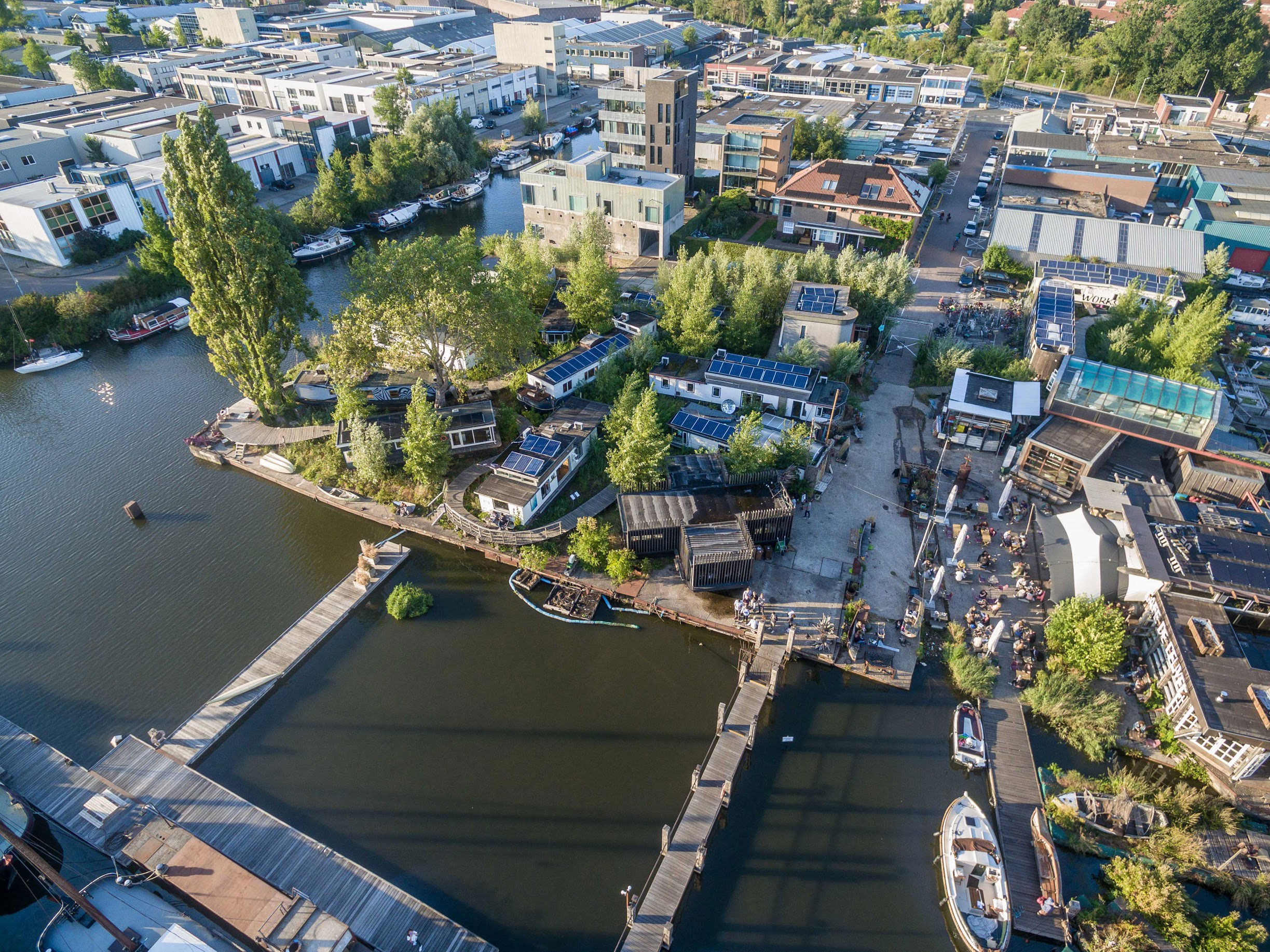De Ceuvel
In the year of 2010 the urbanistic project ‘De Ceuvel’ was initiated and won the tender from the Municipality of Amsterdam. For the next ten years, this piece of former wasteland will be transformed into a self healing garden with many other positive side effects. De Ceuvel is one of the most sustainable and unique urban developments in Europe, transforming the former shipyard ‘De Ceuvel Volharding’ into an urban oasis – a temporary regenerative communal space of refurbished houseboats offering space for creative and social enterprises.
Furthermore it offers visitors a unique experience walking along a winding jetty between these beautiful, retrofitted houseboats and next to the large amount of special soil-cleaning plants.
In the following 2 years the multidisciplinary team of a diverse group of architects, sustainability experts and members of the community developed a regenerative concept for the former shipyard on the riverside in Amsterdam Noord to recover from its pollution. Due to the small budget they had to deal with, the urban plan was designed to recycle as much material as possible from the wasteland whilst keeping the factor of mobility and flexibility in mind.
The site showcases creatively retrofitted houseboats connected through a bamboo pathway, which is surrounded by a rolling terrain of soil purifying vegetation. Delva Landscape architects and Metabolic collaborated to design the Cleantech Playground and phytoremediation park. This verdant sanctuary serves as a terrestrial haven for boats that would otherwise have faced demolition. Being predominantly self-sustaining entities, the boats can depart the premises without leaving any discernible impact once the ten-year period elapses – over ten workspaces and beyond a research lab for sustainable methods were created.
Due to the self-sufficient and regenerative aspect of the project the water cycle and energy cycle were the two main challenges the design teams had to face, together with the focus on regenerating the polluted soil. Through the efforts of Delva Landscape architects and Metabolic as well as the collaboration with the tenants, De Ceuvel managed to reduce the water usage in the houseboats per capita to 5 liters – whereas the per capita average use is 25 liters in Amsterdam (Pieterse-Quirijns et al. 2009).
This reduction comes with a reduction in private commodities (showers and washing machines were excluded from the houseboats), and the sanitary systems were not connected to the main sewage system of the city. Thus tenants had to periodically empty out the pallet filled grey water tanks, which resulted in modest dissatisfactions by the tenants. The bio-filtrated grey water, although not being safe enough for personal use, was determined to be clean enough for soil filtration. (E. Klaversma 2016)
By installing solar panels on each houseboat, the project achieved complete energy self-sustainability, allowing each tenant to determine their own energy usage. This led to the creation of an interesting phenomenon within the De Ceuvel community: the development of an energy-coin called “Jouliettes”. If a tenant does not use the generated energy, they have the option to transfer it to another tenant in the form of this coin. Initially designed as a compensation-free system to foster a sense of communal responsibility and benefit, the reality differed from expectations. Tenants were hesitant to give away energy without compensation and instead preferred to sell it to the Amsterdam Energy Network in exchange for monetary rewards. (Kyra Bekhuis 2018) To counter these non-communal actions, the De Ceuvel community implemented a second coin, the “Ceuveltje”. Members who contribute energy to the local café are rewarded with Ceuveltje, which they can then use to purchase items at the café. (Kyra Bekhuis 2018)
This internal division of communities didn’t impede De Ceuvel to be open towards the outside, since its establishment in 2014, De Ceuvel has attracted numerous individuals from diverse backgrounds, inviting them to experience the products grown and processed in the cafe, participating in an immersive tour of the cleantech playground, attending sustainability workshops or participate the music events such as ‘Trashlessfestival. (Space & Matter 2014) This positive engaging with the Exo-De-Ceuvel society was a key factor in the exponential success of the project, making it became internationally famous and considered by some as a role model for future projects.
The social aim of the project was not only for targeted sustainability solutions but also for a “cultural transition”, asserting that individuals need to adopt new ways of thinking and learn how to implement innovative techniques and technologies. (Van Den Meerssche, D., Gordon, G. 2017) While it was initially conceived as a temporary endeavor, it has the potential to become a permanent one. Its temporality, along with its reliable mobile infrastructure, may allow De Ceuvel to expand into other fringe areas in Amsterdam that require clean-tech innovations. Nevertheless, the challenge of the De Ceuvel experiment lies not in simply replicating and recreating it in a new location, but in adapting to a new context and addressing the associated economic, environmental, social, and cultural challenges. The sentiment expressed by one of its tenants makes this clear, stating that they still have the vision to “re-create it [De Ceuvel] somewhere else.” (M. Lavanga, M. Drosnerm 2018).
(Sebastian Vella, Tobias Sam)
Photo credits: Martijn van Wijk, Space Matter, Jean-Pierre Jans
De Ceuvel
- Authors: Sascha Glasl, Marjolein Smeele, Martijn van Wijk in collaboration with: Delva Landscape Architects, Metabolic, Transsolar, Bas van Schelven, Witteveen en Bos Huib Koel, Woodies at Berlin
- Location: Amsterdam
- Year: 2012 - 2025
- Budget: 1.200.000,-€
- URL: https://deceuvel.nl/en/

